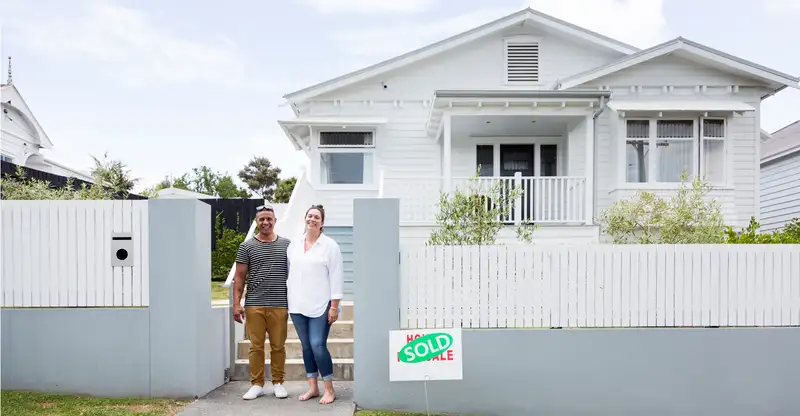Checklist before you make an offer
Make sure you've:
- Been given conditional approval by one of our home loan specialists and confirmation that we're happy to lend on this specific property
- Done your due diligence — you've involved a lawyer and completed the recommended checks and inspections of the property
If you're ready to go, these are the steps you'll need to take.
-
1Tahi
Review the Sale & Purchase Agreement
The Sale and Purchase Agreement is the standard document used to make an offer. The real estate agent will provide this to you, pre-filled with the property details.
Together with your lawyer you should review and edit if you need to:
- The settlement date
- The deposit amount to be paid when the offer goes unconditional (typically 10% of the purchase price)
- The chattels included (such as a garden shed or curtains)
You'll need to add the price you're offering too. Your home loan specialist will also need to see the Sale and Purchase Agreement.
-
2Rua
Include your conditions, if you have any
You can make a conditional offer or an unconditional offer.
To make a conditional offer, find the section on the Sale and Purchase Agreement with your lawyer and add your conditions (see common conditions below). If this offer is accepted, once the conditions are met, the offer 'goes unconditional'.
If you want to make an unconditional offer, talk to your lawyer first and make sure you've completed all your due diligence. If you're going to an auction, all bids are unconditional offers.
-
3Toru
Make your offer
In most cases, making an offer involves finalising your Sale and Purchase Agreement with your lawyer and real estate agent. They'll then take the agreement to the vendor and present them the offer.
What happens next depends on the situation:
- If your offer is conditional and the vendor accepts, it's time to start fulfilling your conditions, for example getting a building inspection.
- If your offer is unconditional and the vendor accepts — congratulations! As long as you meet all the requirements of settlement, the property will be yours.
- If the vendor doesn't accept, you can go back and forth negotiating until you reach an agreement. Anything in the offer is up for negotiation — the price, the settlement date, the initial deposit amount, the chattels and the conditions. All negotiating is done through the real estate agent if there is one.
Once both you and the vendor have signed the Sale and Purchase Agreement, the offer is accepted.
Making an offer like this is one of many ways to buy a house.

Common conditions
For your own peace of mind and protection, it's important that your conditions are worded in a way that allows you flexibility to exit the agreement. Your lawyer will be best placed to advise on how to draft these conditions to suit your situation.
-
Building inspection satisfactory to you
This condition gives you time to get a licensed building surveyor to inspect the property to check for any issues. Ask them to give you an idea of what it might cost to fix anything they find.
If the building surveyor finds any problems, you may also want to get a report from an engineer.
-
Finance satisfactory to you
This gives you time to confirm your home loan with us. Even if you've been pre-approved up to a certain amount, you still need to share the details of the specific property with your home loan specialist so we can confirm we're happy to lend on it.
-
Valuation satisfactory to you
If you want to get a registered valuation to tell you the market price of the property, this gives you time to organise it. If the valuation doesn’t meet your expectations, you can withdraw your offer.
-
Insurance satisfactory to you
If you haven’t already confirmed that you can get insurance on the property, you might want to add it as a condition to give you time to get a quote. You can choose between different levels of cover, such as premium, plus and standard with Tower.
-
Conditional on any other report
You can add your own conditions to the Sale and Purchase Agreement depending on what your situation is. See common checks and inspections.
-
Subject to due diligence
This can mean almost anything — it’s usually used if you want to make additions or improvements to the property and you need time to check with the authorities that you’ll be allowed to do the work.
-
Sellers' conditions
The vendor you're buying the property from can also specify conditions before signing the Sale and Purchase Agreement, usually giving them an ‘escape clause’. This means that if they get a better offer, they can give you a deadline to meet your conditions, and if you can't then they're free to accept another offer.
Let's get your offer on the table
We've got tools and specialists to help you through the process.
Talk to a specialist
Our home loan specialists can provide you with conditional approval and support your process of making an offer.
Find a specialistHouse insurance
Before you make an offer, check that the house is insurable.
See Tower insurance optionsFirst home buyer calculator
Check your numbers one last time now that you've chosen a house.
Calculate nowHome loan standard terms and conditions
Displayed interest rates are subject to change. Kiwibank’s lending criteria, terms and conditions, and fees apply.